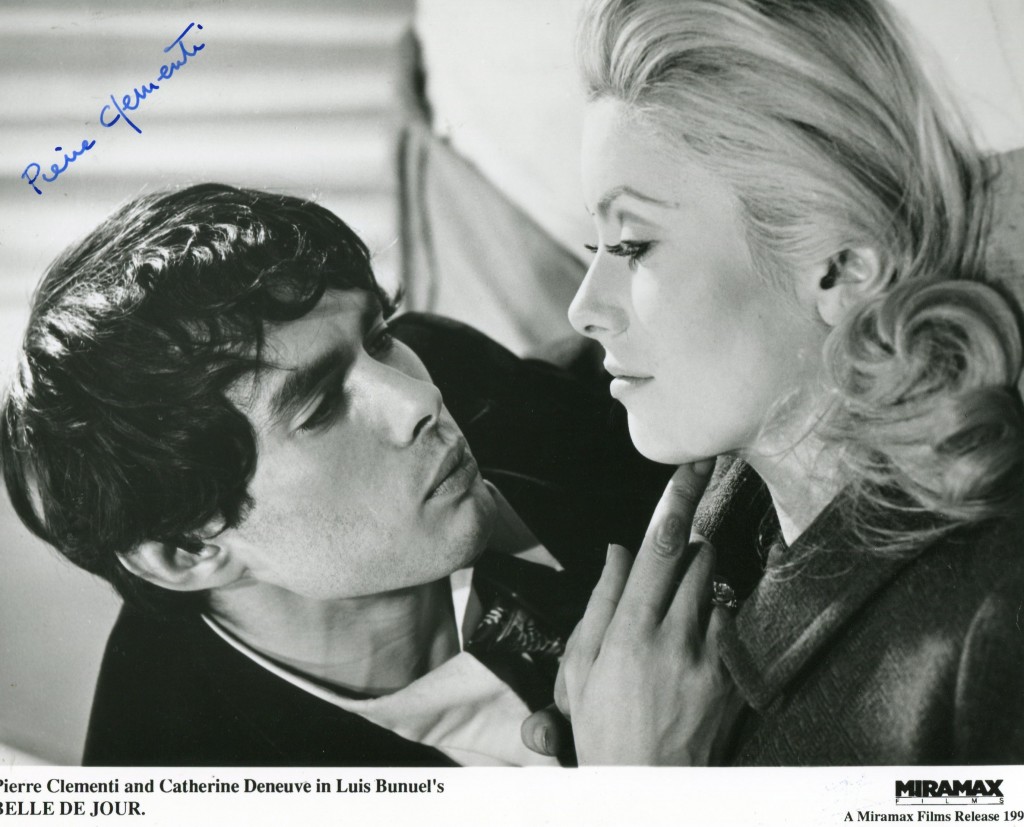
Born in Paris, Clémenti studied drama and began his acting career in the theatre. He secured his first minor screen roles in 1960 in Yves Allégret‘s Chien de pique performing alongside Eddie Constantine. Arguably, his most famous role was that of gangster lover of bourgeois prostitute Catherine Deneuve in Belle de jour, the 1967 classic by Luis Buñuel, in whose film La voie lactée he played the Devil.
In 1972, his career was derailed after he was sentenced to prison for allegedly possessing or using drugs. Due to insufficient evidence, Clémenti was released after 17 months; later he penned a book about his time in prison. Throughout his career, he continued to be active in the theatre.
He was also involved with the French underground film movement, directing several of his own films which often featured fellow underground filmmakers and actors. . He went on to direct La Revolution ce n’est qu’un debut, continuons le combat, In the Shadow of the Blue Rascal and Sun.
He died of liver cancer in 1999.
Brian Baxter’s “Guardian” obituary:
The films of the French actor-director Pierre Clémenti, who has died of cancer aged 57, included Luchino Visconti’s The Leopard (1962), Luis Buñuel’s Belle de Jour (1967), and The Milky Way (1969), Pier Paolo Pasolini’s Pigsty (1969), and Liliana Cavani’s reworking of Antigone, The Cannibals (1970).
In 1971 he worked with Walerian Borowczyk in Blanche, and, for the decidedly less flakey Hungarian director Miklos Jancso, in The Pacifist, opposite Monica Vitti. His politics were in evidence with these directors, and, more markedly, with the Brazilian Glauber Rocha, who directed him in Cabezas Cortadas (1970). He made two movies for Bernardo Bertolucci. After Partner (1968), he was rewarded with a key role in the director’s masterpiece The Conformist.
Yet the charitable view of Clémenti and his 40-year career would be that he did not realise his potential. The reasons involve his back ground and lack of training, rightwing pressures and post-1970s changes in world cinema which marginalised him and other radicals. An alternative version is that he was not a versatile actor, and, as a director – of four features and some shorts – his interests ended with the experimental and avant-garde. He was an art-house figure, a sexy, disturbing, androgynous presence in some memorable European films made between the early 1960s and the late 1970s. Many of his roles were minor, especially as his looks faded, and he only occasionally acted in mainstream cinema – for example, in the period romp Benjamin (1968).
Clémenti was born in Paris, to an unknown father, and while young, spent time in reform school. His film career began in 1960 with Yves Allegret’s Chien de Pique. Two years later Visconti cast him as Burt Lancaster’s son in The Leopard, and his sultry, full-lipped face won him parts in French and Italian movies. He also featured in a French television series.
His big break came with his role in Belle de Jour, starring Catherine Deneuve, and in 1968 he was reunited with her when, at 26, he starred in Benjamin, as a 17-year-old trying to lose his virginity. “Clémenti indicates adolescent innocence by being loose-limbed and girlish,” wrote Pauline Kael. “It is essential for the boy to suggest the kind of man he will become once he has learned what everyone is so eager to teach him, but Clémenti looks as though he would become a lesbian.”
The period from the making of Belle de Jour was wonderfully productive, but in 1971 Clémenti was imprisoned in Italy on drugs charges. He never seemed to fully recover from the ordeal, but the experience led to a book and a film, New-Old (1978), which he described as “my diary of my life before and after 1973”. He was bitter about the lack of help from the French authorities over the charges, feeling this was a delayed punishment for his support of the 1968 uprising.
In the late 1960s he began work as a director, initially making 16mm experimental shorts, and the psychedelic Visa de Censure (1968). It was 10 years before he made another feature, New-Old, and a further decade before Soleil (1988), described as a song of love and death and stemming from his theatre work. In the same year, he directed A l’Ombre de la Canaille Bleue, which, like the others, only surfaced in a Cinemateque Francaise retrospective of experimental movies.
After his release from prison in 1973, Clémenti worked for Dusan Makavejev, playing a sailor in the outrageous Sweet Movie. A sturdy version of Herman Hesse’s Steppenwolf (1974) followed, and his leftist credentials earned him a role in the Marxist The Red Poster (1976). Several weak films followed, then he took the lead in Jean-Jacques Andrien’s debut feature, Le Fils d’Amr est Mort (1978), a magical work which nonetheless failed to revive the actor’s career. During the next 20 years, Clémenti worked mainly in Portugal, France and Germany, and had a small part, as Vic, in the independent American director James Toback’s thriller Exposed (1983), with a cast that included Rudolf Nureyev, Bibi Andersson and Harvey Keitel.
Although he worked in the theatre and occasional films, including L’Autrichienne (1989) opposite Ute Lemper and Massacre (1995), by the 1990s his looks had gone and he was memorably described as “a broken dandy” – a description which encompassed his Wildean sense of the extravagant. Oddly, his last film was British, Hideous Kinky (1998), but his role was minor. Ill-health had cut his workload to a minimum.
Clémenti was not a great actor, but he was an incarnation of a period long gone from both cinema and life. It is now replaced with the conformity he could not abide.
Pierre Clémenti, actor, director, born September 28 1942; died December 28 1999
The above “Guardian” obituary can also be accessed online here.

